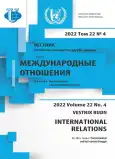Discourses of “Europeanness” in Asylum Practices in the Postcolonial Context
- Autores: Morgunova O.A.1, Moraru N.1
-
Afiliações:
- Peoples’ Friendship University of Russia (RUDN University)
- Edição: Volume 22, Nº 4 (2022): Postcolonialism and Anti-colonial Struggle
- Páginas: 741-754
- Seção: THEMATIC DOSSIER
- URL: https://journal-vniispk.ru/2313-0660/article/view/320514
- DOI: https://doi.org/10.22363/2313-0660-2022-22-4-741-754
- ID: 320514
Citar
Resumo
This article examines the impact of ethno-racial factors on perceptions of refugees and asylum practices in the European postcolonial context. Using Discourse-Historical Approach (DHA) the authors analyse “Europe for Europeans” public discourse against the backdrop of the 2015-2016 migration crisis, the humanitarian disaster on the Polish-Belarusian border in 2021 and asylum seekers’ influx in spring 2022. The study shows that attitudes to refugees and their “right” to asylum in a European country are impacted by ethno-racial markers of applicants. Such discursive practices call into question one of the understandings of Europeanness, namely Europe as the embodiment of advanced political ethics, since European political discourse has recently positioned a refugee from the Middle East and North Africa as an “alien” “non-European,” thus normalizing threats to human life in allegedly “uncivilized” parts of the world. This normalization is consequently affecting the decision making in asylum process. The problematization of discursive aspects of asylum allows us to expand DHA to the international sphere, where different national models and cultural contexts collide, allowing us to talk about the influence of discursive practices on the political decisions in international relations. The evolution of the concept of asylum in the postcolonial context is considered in connection with the ideology of Europeanism, which is currently in the process of formation. Although ideas about Europeanness have undergone major transformations, this study shows that a systematic study of the entire range of conceptual meanings of this discursive object has not yet been carried out. Thus, Europeanness is either interpreted as a set of desired social ideals and values, or, reductively, as a quality associated exclusively with European institutions in their current form. Both interfere with the postcolonial debate about the nature of “Europe” and “Europeanness” in the postcolonial world.
Palavras-chave
Sobre autores
Oksana Morgunova
Peoples’ Friendship University of Russia (RUDN University)
Autor responsável pela correspondência
Email: o_morgunova@hotmail.com
ORCID ID: 0000-0003-2607-5599
PhD (University of Edinburgh), Associate Professor, Department of Theory and History of International Relations
Moscow, Russian FederationNicoleta-Florina Moraru
Peoples’ Friendship University of Russia (RUDN University)
Email: moraru-n@rudn.ru
ORCID ID: 0000-0002-4768-9437
Assistant, Department of Theory and History of International Relations
Moscow, Russian FederationBibliografia
- Aprile, S. (2010). Le Siècle des exilés. Bannis et proscrits de 1789 à la Commune. Paris: CNRS Éditions.
- Biebuyck, W. (2011). Europeanism. Journal of Contemporary European Studies, 19(2), 314-316. http://doi.org/10.1080/14782804.2011.580937
- Bisson, L. S. (2018). External dimension of the EU migration policy: Instruments and benefits. Scientific and Analytical Herald of IE RAS, (5), 21-26. (In Russian).
- Debnár, M. (2016). Migration, whiteness, and cosmopolitanism: Europeans in Japan. New York: Palgrave Macmillan.
- Fox, J. E., Moroşanu, L., & Szilassy, E. (2015). Denying discrimination: Status, ‘race’, and the whitening of Britain’s new Europeans. Journal of Ethnic and Migration Studies, 41(5), 729-748. http://doi.org/10.1080/1369183X.2014.962491
- Gilroy, P. (1993). The Black Atlantic: Modernity and double-consciousness. Cambridge: Harvard University Pres.
- Gilroy, P. (2000). Between camps: Nations, cultures and the allure of race. London: Allen Lane.
- Guðjónsdóttir, G. & Loftsdóttir, K. (2017). Being a desirable migrant: Perception and racialisation of Icelandic migrants in Norway. Journal of Ethnic and Migration Studies, 43(5), 791-808. http://doi.org/10.1080/1369183X.2016.1199268
- Jennequin, A. (2020). Turkey and the weaponization of Syrian refugees. Policy Brief of Brussels International Center, 1-10. Retrieved from https://www.bic-rhr.com/research/turkey-and-weaponization-syrian-refugees
- Krivonos, D. (2018). Claims to whiteness: Young unemployed Russian-speakers’ declassificatory struggles in Finland. The Sociological Review, 66(6), 1145-1160. http://doi.org/10.1177/0038026117737412
- Loescher, G. (2021). Refugees: A very short introduction. Oxford: Oxford University Press. https://doi.org/10.1093/actrade/9780198811787.001.0001
- Martén, L. (2015). Political bias in court? Lay judges and asylum appeals. Working Papers of Uppsala University, (2), 1-44. Retrieved from https://www.econstor.eu/bitstream/10419/125543/1/824067258.pdf
- McCormick, J. (2010). Europeanism. Oxford: Oxford University Press. https://doi.org/10.1093/acprof:oso/9780199556212.001.0001
- Morgunova, O. A. (2010). “Europeans live in Europe!” The search for identity in Internet communities amongst UK Russian migrants. Diasporas, (1), 129-141. (In Russian).
- Morgunova, O. A. (2020). Homi Bhabha: From the decolonization of culture to the understanding of deglobalization. In T. M. Gavristova & N. E. Khokholkova (Eds.), Africa: Postcolonial discourse (pp. 50-59). Moscow: Institut Afriki RAN publ. (In Russian).
- Morgunova, O. A., & Belogrud, I. N. (2018). Some aspects of regulation of migration in the second half the 19th - early 20th centuries (on the example of Great Britain). Sovremennaya Nauchnaya Mysl’, (6), 62-66. (In Russian).
- Ostrowski, M. S. (2021). Europeanism: A historical view. Contemporary European History, 1-18. https://doi.org/10.1017/S0960777321000485
- Potemkina, O. Yu. (2016). Migration crisis and European Union policy. Current Problems of Europe, (4), 38-60. (In Russian).
- Potemkina, O. Yu. (2022). Ukrainian refugees in the European Union: A new migration crisis? Scientific and Analytical Herald of IE RAS, (2), 7-15. (In Russian).
- Puwar, N. (2004). Space invaders: Race, gender and bodies out of place. Oxford: Berg Publishers.
- Said, E. W. (1994). Orientalism. New York: Vintage Books.
- Samaluk, B. (2014). Whiteness, ethnic privilege and migration: A Bourdieuian framework. Journal of Managerial Psychology, 29(4), 370-388. https://doi.org/10.1108/JMP-03-2012-0096
- Wodak, R. (2009). The discourse of politics in action: Politics as usual. London: Palgrave Macmillan. https://doi.org/10.1057/9780230316539
- Zharkova, U. A., & Kuznetsova, N. Yu. (2018). Objectification of ethnic discrimination in German media culture. Kazan Bulletin of Young Scientists, 2(4), 116-119. (In Russian).
Arquivos suplementares









